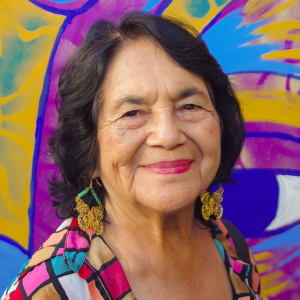Equality Talks: Cristina Escobar
May 16, 2024
In episode 17 of the Equality Talks podcast, host Elisa Parker introduces us to legendary civil rights activist, Dolores Huerta, president of the Dolores Huerta Foundation. At 93 years old, Huerta is almost as old as the 100 year movement to publish the Equal Rights Amendment and she is determined to make sure that happens within her lifetime. As the co-founder of the United Farm Workers Association along with Cesar Chavez, and a leader of the feminist movement, she continues to transform communities and challenge systems to better serve the people most often underrepresented, especially the rural Latino community, women, and youth. Her passion is contagious as she reminds all of us, si se puede. Yes we can!
Elisa speaks with Huerta about her history co-founding a movement in the 1960's when women's recognition as civic leaders was often challenged, and how that might have shifted with a feminist lens. She discusses how the ERA would support true equality in our country, where her courage to show up for herself stems from, and how she supports other women to engage in public service. Her mission follows the words of former Mexican President Benito Juarez: "respect for the rights of others is peace."

Co-founder of the United Farm Workers Association, Dolores Clara Fernandez Huerta is one of the most influential labor activists of the 20th century and a leader of the Chicano civil rights movement.
Born on April 10, 1930 in Dawson, New Mexico, Huerta was the second of three children of Alicia and Juan Fernandez, a farm worker and miner who became a state legislator in 1938. Her parents divorced when Huerta was three years old, and her mother moved to Stockton, California with her children. Huerta’s grandfather helped raise Huerta and her two brothers while her mother juggled jobs as a waitress and cannery worker until she could buy a small hotel and restaurant. Alicia’s community activism and compassionate treatment of workers greatly influenced her daughter.
Discrimination also helped shape Huerta. A schoolteacher, prejudiced against Hispanics, accused Huerta of cheating because her papers were too well-written. In 1945 at the end of World War II, white men brutally beat her brother for wearing a Zoot-Suit, a popular Latino fashion.
Huerta received an associate teaching degree from the University of the Pacific’s Delta College. She married Ralph Head while a student and had two daughters, though the couple soon divorced. She subsequently married fellow activist Ventura Huerta with whom she had five children, though that marriage also did not last. Huerta briefly taught school in the 1950s, but seeing so many hungry farm children coming to school, she thought she could do more to help them by organizing farmers and farm workers.
In 1955 Huerta began her career as an activist when she co-founded the Stockton chapter of the Community Service Organization (CSO), which led voter registration drives and fought for economic improvements for Hispanics. She also founded the Agricultural Workers Association. Through a CSO associate, Huerta met activist César Chávez, with whom she shared an interest in organizing farm workers. In 1962, Huerta and Chávez founded the National Farm Workers Association (NFWA), the predecessor of the United Farm Workers’ Union (UFW), which formed three year later. Huerta served as UFW vice president until 1999.
Despite ethnic and gender bias, Huerta helped organize the 1965 Delano strike of 5,000 grape workers and was the lead negotiator in the workers’ contract that followed. Throughout her work with the UFW, Huerta organized workers, negotiated contracts, advocated for safer working conditions including the elimination of harmful pesticides. She also fought for unemployment and healthcare benefits for agricultural workers. Huerta was the driving force behind the nationwide table grape boycotts in the late 1960s that led to a successful union contract by 1970.
In 1973, Huerta led another consumer boycott of grapes that resulted in the ground-breaking California Agricultural Labor Relations Act of 1975, which allowed farm workers to form unions and bargain for better wages and conditions. Throughout the 1970s and ‘80s, Huerta worked as a lobbyist to improve workers’ legislative representation. During the 1990s and 2000s, she worked to elect more Latinos and women to political office and has championed women’s issues.
The recipient of many honors, Huerta received the Eleanor Roosevelt Human Rights Award in 1998 and the Presidential Medal of Freedom in 2012. As of 2015, she was a board member of the Feminist Majority Foundation, the Secretary-Treasurer Emeritus of the United Farm Workers of America, and the President of the Dolores Huerta Foundation.
Bio by Michals, Debra. "Dolores Huerta." National Women's History Museum. 2015. www.womenshistory.org/education-resources/biographies/dolores-huerta.
By making a contribution to the ERA Coalition, you help us share the stories of the marginalized and historically underrepresented communities and voices who are fighting for equality every single day!